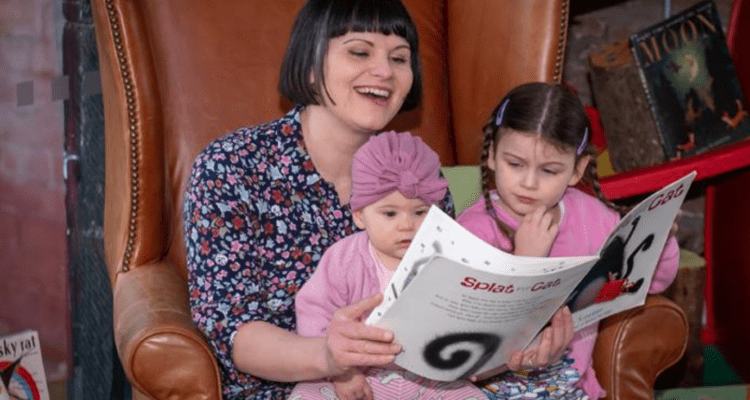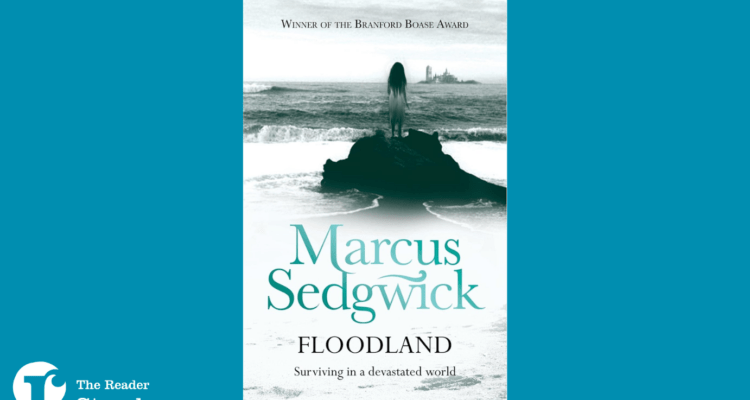Poets Walk The Line to support The Reader Organisation
This October four poets - Gaia Holmes, Julia Deakin, William Thirsk-Gaskill and Michael Stewart - took on the challenge of tracing the 47 mile trail of the Stanza Stones, commissioned by Ilkley Literature Festival and created by Simon Armitage, on their one year anniversary. The trek, called Walking The Line, proved to be inspiring, eye-opening and gruelling in equal measure, and The Reader Organisation was honoured that such a thoroughly literary journey supported our work. The fifth 'member' of the group was one of Simon Armitage's socks, used to fundraise along the way and we're happy to announce that the group raised over £100 to support our outreach work.
One of the Walking The Line poets, Michael Stewart, joined us for our Reading in Secure Environments (RISE) project last year, visiting HMP Low Newton to read to some of the women there. Michael chose to put forward The Reader Organisation as Walking The Line's chosen charity as he was 'deeply affected' by his visit as part of RISE. Watch the video charting the first year of RISE, featuring participating authors, on our website.
Michael also blogged about the Walking The Line experience and with kind permission, his blog has been reproduced below.
On behalf of all of us at The Reader Organisation, we'd like to extend a huge congratulations and thank you to the Walking The Line team for their heroic and poetic efforts.
From Michael Stewart: 'Walking The Line: Over and Out'
We launched the event in the Riverhead Tavern in Marsden on Thursday 17th of October, at 7.30pm. In attendance was a small but appreciative audience, that included a 67 year old wild camper from Stockton-on-Tees who is originally from Scotland, called Freddie Phillips. He had brought his tent, sleeping bag and stove on his back, and was going to walk the entire 47 miles with us over the three days, wild camping along the way. I’ve got to know Freddie along the journey, and he is an amiable chap and an inspiration to us all. Also joining us, the tattooed poet from Wigan and fellow Grist writer, Matt O’Brien; and Angela Varley (another Grist poet), who brought homemade flapjack and a bottle of brandy, to sustain us on our journey. We collected £27.20 in Simon’s sock.
The next morning, we set off from the New Inn, meeting up with Winston Plowes, another writer, but also a children’s entertainer and narrow boat resident. We walked along the canal towpath a short distance, then began the ascent of Pule Hill, passing the memorial cross on the way. There were no views of Marsden, as promised, only a thick blanket of fog. In the quarry, we found the first stone: SNOW. We read the poem out-loud, then chatted about it. I said I thought the line about the ‘unnatural pheasant’ was a political line, and we discussed the effect of grouse shooting and how much the landed gentry paid for the privilege of shooting these birds and other game birds. We talked about the illegal practice of shooting raptors and corvids.
Later, we joined the Pennine Way and walked across the scarily high bridge over the M62. All these years of travelling along the motorway by car had given me one perspective of the landscape, now I was having to re-adjust, as I took in a completely different one. We trekked across Blackstone Edge, where in 1846 there had been a gathering of 30,000 thousand, who had come to listen to the Chartist, Ernest Jones. We dropped down and stopped at the White House pub.
There we were joined by Andrew Moorhouse, publisher of the beautiful limited edition book, In Memory Of Water. The book features the stanza stones poems, together with specially commissioned wood engravings by Hilary Paynter (for more information about the book, see here: http://andrewjmoorhouse.webs.com/). We were also joined by an Otley Morris dancer and her family.
We had a bite to eat, then set off on our way again. Not far from the pub, we encountered the second stone: RAIN. This is the most prominent off all the poems, carved directly into the rock face. On sunny days, the letters shine and twinkle, with the quartz crystals embedded in the coarse gritstone. This was not a sunny day. The iron in the stone has oxidised, giving the letters a lovely orange glow. We talked about the military language in the poem, ‘sea-bullet’, ‘air-lifted’, ‘strafes’, and how this was a theme throughout the collection. Almost as though Simon was turning these reflections on nature, into war poems: man against the elements.
We arrived in Hebden 18.6 miles later, a bit bedraggled but elated. That night we read in front of a packed audience at Hebden Bridge Library. The library had done a brilliant job of publicising the event, and we were very grateful to receive such warm hospitality. We collected £71 in Simon’s sock. We celebrated by downing a few real ales in the White Lion pub. Then, at midnight, we left Freddie in a torrent of rain, as he went to hunt for a wild space to camp for the night.
The next morning we met six new walkers outside the Nutclough Tavern and walked through Nutclough Wood. We began a steep climb up the hill. Here, disaster struck, as Gaia sustained a serious back injury which left her in absolute agony, and with great regret, had to be escorted back down the hill. We carried on, joining the Calderdale Way. We traipsed across the moor, disturbing some irritated-sounding grouse, until we dropped down into Lowe Farm, with its turreted tower.
We walked across a lovely old bridge over Luddenden Brook. I’d been speaking to Andrew Moorhouse the day before about the secret stanza stone, that no one had found. He told me it had been set in the side of Luddenden Brook, but almost immediately, there had been a flood, and the stone had been washed away, making it now hidden from all. I learned that the stone was carved with the apposite phrase, ‘in memory of water’.
A few miles later, past Warley Moor Reservoir, we came across the third stone: MIST. This is perhaps, with the exception of the secret stone, the hardest to find. It is concealed beneath a sandstone quarry. The stone the poem has been carved into had started out in one piece but split down the middle during the carving. Adding further poignancy to the mutability of the landscape and the fraught task of carving the stones themselves. We greatly admired Pip Hall’s work. The work of a stone carver is perhaps one of the few, where not a single mistake is permitted.
We carried on past Thornton Moor Reservoir and then down for lunch in the Dog and Gun pub. Here we were joined by another group which included the writer Leonora Rustamova, in tight lycra shorts. That night we read in the Brown Cow pub in Bingley. The audience was a very select one, and we competed with the rock band playing covers downstairs. In the audience was writer Char March, who read some of her own work, after we had finished, and really made the event memorable. We collected £10 in Simon’s sock.
The next day, we set off from Bingley station, joining a group of over a dozen walkers and writers, including the novelist and short story writer, Simon Crump, who was dressed in a vintage tweed suit, a tweed flat cap and was carrying two pints of milk and a bottle of rum. We walked along the canal, past the impressive construction of the Bingley Five Rise Locks. We passed some clay pigeon shooters who tried to kidnap Simon for their mascot, and into the rather spooky entrance of Rivock Forest. The forest is very atmospheric and put me in mind of a Grimm’s Fairy Tale. I half expected to come across a gingerbread house, but instead, we encountered the next stone: DEW. In fact, DEW is carved into two stones. We discussed again, the use of military imagery in the poem, ‘fuse-wire’, ‘tapers’, ‘primed mortar’, ‘tinder’, ‘trigger’, ‘march’, ‘ranks’, ‘barbed-wire fence’, ‘flags’, ‘surrender’. And argued about whether we wanted to replace the ‘stoat’ with a ‘rat’ instead. We concluded that ‘stoat’ was the right choice after all.
We traipsed across Rombalds Moor to the PUDDLE stone. Or rather, two stones. These stones were reclaimed from an industrial site near Bolton. They had been part of a mill floor but now set free from industry to enjoy the freedom of the heath. There are still marks on the stone, from where iron machinery was fixed to them. The conflict in this poem is of a different type. Instead of man versus the elements, here we have two natural forces competing with each other: the Atlantic sea and the Yorkshire landscape.
At the Twelve Apostles stone circle we were met by another dozen or so walkers, making our party now a merry band of 35 people. We walked with them over Ilkley Moor, to the final stone: BECK ‘Where the water unbinds and hangs over the waterfall’s face, and just for that one stretched white moment becomes lace.’
Later on, we did our final reading at Ilkley Literature Festival’s last night in St Margaret’s Hall. We collected £11.16 in Simon’s sock. Making a grand total of £119.36.
We’d done it. We had survived the experience and arrived at our final destination a little damp and dishevelled, but triumphant. We parted company with hugs and handshakes. It had been emotional.
Thanks goes to all those writers and walkers that joined us on our way and the audiences at each event. Thanks also to the ‘sherpas’ who ferried our books and chattels to the various venues. These were: Stephen Weeks, Lisa Singleton, Sean Bamforth, David Gill and Paul Bose. A special thanks to Freddie Phillips, for joining us the whole distance, and going one further with his wild camping. You put us to shame – here’s tae ye!
This event would not have been possible without the support of The University of Huddersfield, The Arts Council and The Ilkley Literature Festival – and we remain forever indebted to you all.
Read more from Michael on his blog: http://michaelstewartxxx.wordpress.com/
Share
Related Articles

Reader Revisited: Reading with Looked-After Children by Grace Frame
We're taking a trip down memory lane and revisiting articles from The Reader Magazine. This article first appeared in issue…

We’re Hiring! Join our Front of House Team
We're hosting a Recruitment Day at the Mansion House, Calderstones Park on Tuesday 16 April as we look to expand…

The Storybarn Selects… From The Reader Bookshelf
Our last deep dive into the 2023/24 Children and Young People's Reader Bookshelf is a review of Floodland by Marcus Sedgwick…



